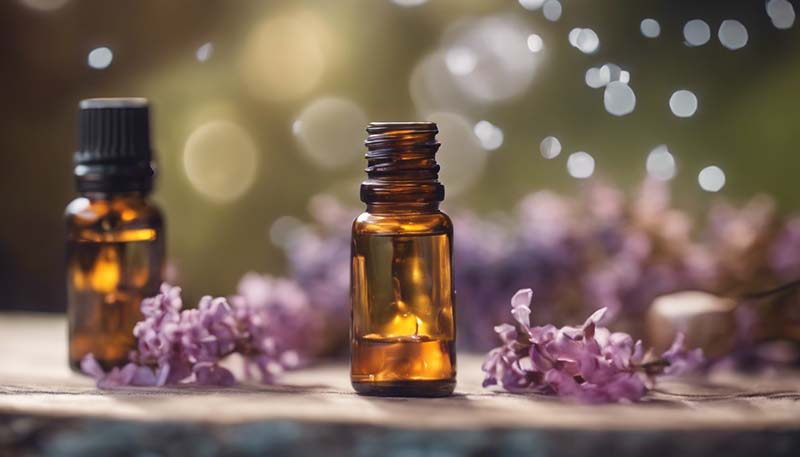The Science Behind Aromatherapy for Stress Relief
The Science Behind Aromatherapy for Stress Relief
Aromatherapy, the practice of using essential oils for therapeutic purposes, has been gaining popularity in recent years. While it's often associated with relaxation and stress relief, many people are still skeptical about its effectiveness. In this article, we'll delve into the science behind aromatherapy and explore how it can help alleviate stress and promote overall well-being.
The Role of Essential Oils
Essential oils are concentrated plant extracts that contain the natural香气 (fragrance) of the plant. They are obtained through various methods, such as distillation or cold pressing. These oils are highly volatile, which means they can evaporate quickly and release their fragrance into the air.
Chemical Composition
Essential oils are complex mixtures containing dozens, sometimes hundreds, of different compounds. These compounds can include terpenes, alcohols, esters, and ketones, among others. It's the combination of these compounds that gives each essential oil its unique aroma and therapeutic properties.
How Aromatherapy Works
When essential oils are inhaled, the fragrance molecules travel through the nasal cavity and reach the olfactory epithelium, a specialized tissue responsible for the sense of smell. From there, the molecules are transmitted to the olfactory bulb, which is connected to various parts of the brain, including the limbic system.
Advertisement
The Limbic System
The limbic system plays a crucial role in regulating emotions, memory, and stress response. It contains structures like the amygdala, which is involved in processing emotions, and the hippocampus, which is important for memory formation. When the fragrance molecules reach the limbic system, they can influence these structures and potentially impact mood and stress levels.
Stress Relief Mechanisms
While the exact mechanisms of how aromatherapy relieves stress are not yet fully understood, several theories have been proposed:
1. Modulation of Neurotransmitters
Some essential oils may have the ability to modulate the levels of certain neurotransmitters in the brain. For example, lavender oil has been shown to increase the levels of serotonin and GABA, which are associated with feelings of well-being and relaxation.
2. Reduction of Cortisol Levels
Cortisol is a hormone released in response to stress. Aromatherapy has been found to reduce cortisol levels in some studies, suggesting that it may help the body respond more effectively to stress.
3. Activation of the Parasympathetic Nervous System
The parasympathetic nervous system is responsible for promoting rest and relaxation. Inhaling certain essential oils may stimulate this system, leading to a state of relaxation and stress relief.
Research Studies
Numerous studies have been conducted to evaluate the effectiveness of aromatherapy for stress relief. While the results are not entirely consistent, many studies have shown positive effects. For example:
Study 1: Lavender and Sleep Quality
A study published in the Journal of Alternative and Complementary Medicine found that participants who inhaled lavender oil before bedtime experienced improved sleep quality and reduced stress levels compared to those who did not.
Study 2: Aromatherapy and Hospital Anxiety
Another study conducted in a hospital setting found that patients who received aromatherapy before surgery experienced less anxiety and required less anesthesia compared to those who did not receive aromatherapy.

Study 3: Aromatherapy for Chronic Stress
A systematic review of multiple studies on aromatherapy for chronic stress found that aromatherapy was effective in reducing stress levels in the majority of the studies reviewed.
Precautions and Considerations
While aromatherapy can be a beneficial tool for stress relief, it's important to use essential oils safely and appropriately. Some precautions to consider include:
1. Quality of Essential Oils
Ensure that you are using high-quality, pure essential oils. Cheaper oils may be diluted or contain additives that can cause adverse reactions.
2. Allergic Reactions
Some individuals may be allergic or sensitive to certain essential oils. It's important to perform a patch test before using a new oil to check for any adverse reactions.
3. Use in Pregnancy and with Children
Some essential oils may not be safe for use during pregnancy or with children. Always consult with a healthcare professional before using aromatherapy in these cases.
4. Potential Interactions with Medications
Essential oils can interact with certain medications, so it's important to discuss their use with a healthcare provider if you are taking any medications.
Conclusion
Aromatherapy, when used correctly, can be a powerful tool for stress relief and promoting overall well-being. While more research is needed to fully understand the mechanisms behind its effects, the existing evidence suggests that it can be a beneficial addition to a comprehensive stress management program. As with any complementary therapy, it's important to approach aromatherapy with an open mind but also a critical eye, using it as a complement to, rather than a replacement for, traditional medical treatments.
Comment